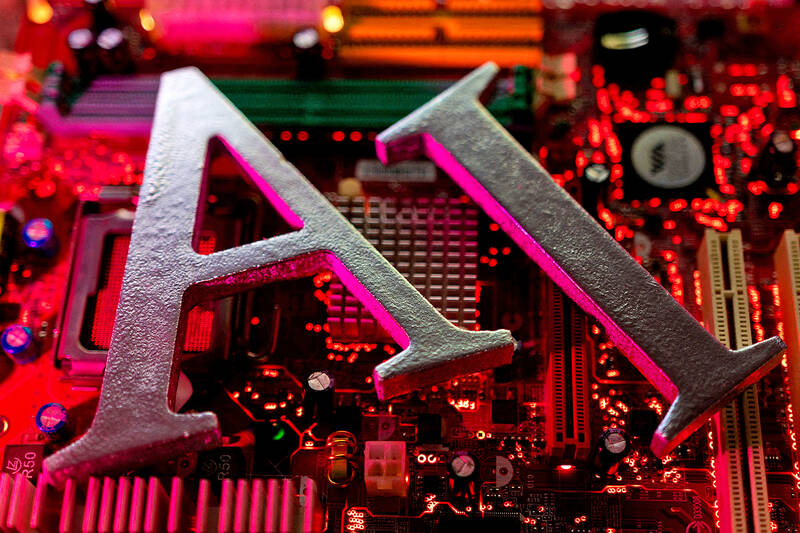Taiwan’s passive component industry is expected to grow 11.1 percent this year and increase another 6.3 percent next year in terms of production value, an Industrial Technology Research Institute analyst said on Tuesday.
The production value of the passive components industry is estimated to grow from NT$217.8 billion (US$6.80 billion) last year to NT$242 billion this year, Hsiao Jui-chung (蕭睿中), an analyst at the government-sponsored institute’s Industry, Science and Technology International Strategy Center said at a seminar on industrial trends in Taipei.
The main reason for the growth is the strong recovery of related industries, namely artificial intelligence (AI) servers and terminals. High demand for these products contributed to the industry’s positive growth in the third quarter, Hsiao said.

Photo: Reuters
The industry’s inventory reached a safe level in the second quarter, with capacity utilization rates for standard products and high-end niche products expected to increase 5 to 10 percent in the second half of the year, he said.
Export values have also grown year-on-year, with every month seeing higher numbers except for February, the month when the Lunar New Year holiday took place.
Market dependency and exports to China have fallen, due to the tech dispute between the US and China, as well as the trend for electric manufacturers to distribute manufacturing, Hsiao said.
Looking ahead, Hsiao predicted that the production value of the industry would grow 6.3 percent next year to NT$257.1 billion, driven by AI computers, smartphones and niche components for vehicle use.
Passive components for vehicle use made up about 17 percent of the industry’s revenue last year, with the proportion expected to rise to 20 percent this year, Hsiao said.
Worldwide demand for vehicle-use multi-layer ceramic capacitors (MLCC) could reach 450 billion units this year, and might increase to 500 billion next year, he said.
An AI laptop needs an average of 200 more MLCCs than a regular laptop, in order to adapt to the higher specifications in its processor and memory, Hsiao said.

UNCERTAINTY: Innolux activated a stringent supply chain management mechanism, as it did during the COVID-19 pandemic, to ensure optimal inventory levels for customers Flat-panel display makers AUO Corp (友達) and Innolux Corp (群創) yesterday said that about 12 to 20 percent of their display business is at risk of potential US tariffs and that they would relocate production or shipment destinations to mitigate the levies’ effects. US tariffs would have a direct impact of US$200 million on AUO’s revenue, company chairman Paul Peng (彭雙浪) told reporters on the sidelines of the Touch Taiwan trade show in Taipei yesterday. That would make up about 12 percent of the company’s overall revenue. To cope with the tariff uncertainty, AUO plans to allocate its production to manufacturing facilities in

TAKING STOCK: A Taiwanese cookware firm in Vietnam urged customers to assess inventory or place orders early so shipments can reach the US while tariffs are paused Taiwanese businesses in Vietnam are exploring alternatives after the White House imposed a 46 percent import duty on Vietnamese goods, following US President Donald Trump’s announcement of “reciprocal” tariffs on the US’ trading partners. Lo Shih-liang (羅世良), chairman of Brico Industry Co (裕茂工業), a Taiwanese company that manufactures cast iron cookware and stove components in Vietnam, said that more than 40 percent of his business was tied to the US market, describing the constant US policy shifts as an emotional roller coaster. “I work during the day and stay up all night watching the news. I’ve been following US news until 3am

COLLABORATION: Given Taiwan’s key position in global supply chains, the US firm is discussing strategies with local partners and clients to deal with global uncertainties Advanced Micro Devices Inc (AMD) yesterday said it is meeting with local ecosystem partners, including Taiwan Semiconductor Manufacturing Co (TSMC, 台積電), to discuss strategies, including long-term manufacturing, to navigate uncertainties such as US tariffs, as Taiwan occupies an important position in global supply chains. AMD chief executive officer Lisa Su (蘇姿丰) told reporters that Taiwan is an important part of the chip designer’s ecosystem and she is discussing with partners and customers in Taiwan to forge strong collaborations on different areas during this critical period. AMD has just become the first artificial-intelligence (AI) server chip customer of TSMC to utilize its advanced

Six years ago, LVMH’s billionaire CEO Bernard Arnault and US President Donald Trump cut the blue ribbon on a factory in rural Texas that would make designer handbags for Louis Vuitton, one of the world’s best-known luxury brands. However, since the high-profile opening, the factory has faced a host of problems limiting production, 11 former Louis Vuitton employees said. The site has consistently ranked among the worst-performing for Louis Vuitton globally, “significantly” underperforming other facilities, said three former Louis Vuitton workers and a senior industry source, who cited internal rankings shared with staff. The plant’s problems — which have not